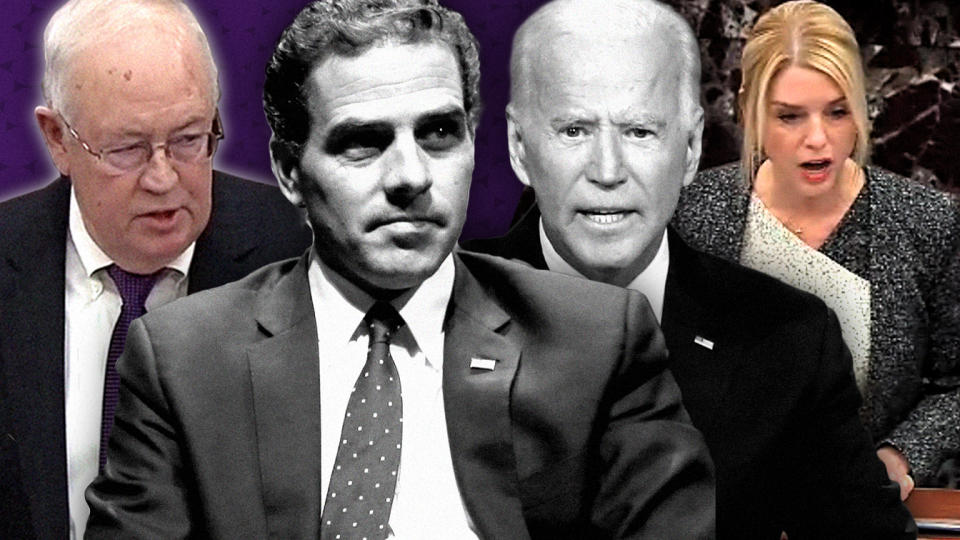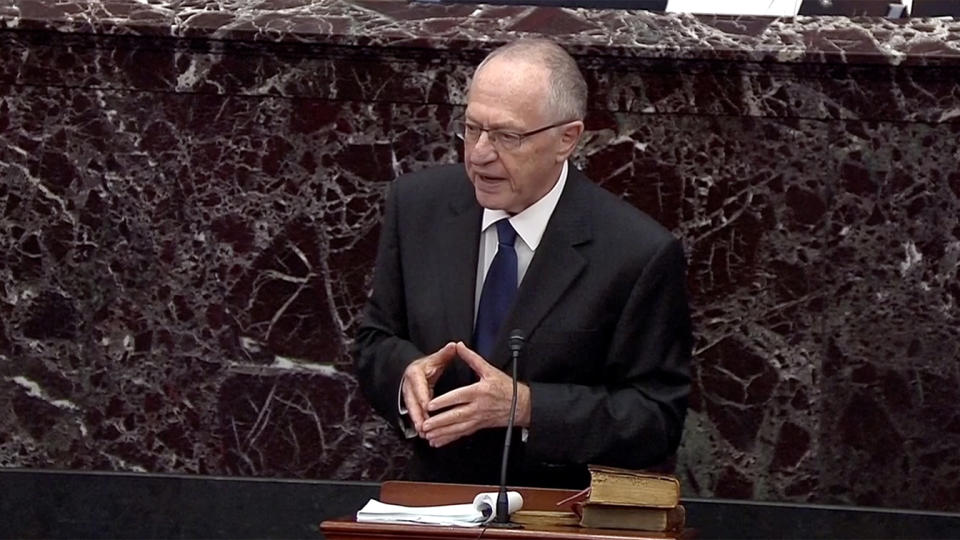Trump’s impeachment defense: Ken Starr’s lecture on partisanship followed by attacks on Joe Biden
WASHINGTON — President Trump’s defense team began its second day of arguments with a high-minded lecture from Ken Starr about the dangers of partisan impeachments, before launching scathing broadsides at one of the president’s top rivals for the presidency, Democrat Joe Biden.
Starr, the independent counsel during the 1990s who investigated then-President Bill Clinton and was seen as a highly partisan figure, was the first lawyer on Monday to make the case that Trump should not be removed from office, as the president’s defense began its first full day after a shortened session on Saturday.
“Like war, impeachment is hell,” Starr told the Senate, chastising Democrats for pursuing impeachment when there was not overwhelming public support for doing so.
“There is no national consensus. We might wish for one, but there isn’t,” Starr said. Support for Trump’s impeachment divides sharply among partisan lines, with most Democrats supporting impeachment and removal from office, and most Republicans opposing it. Independents favor impeachment by just over 50 percent, but less than 50 percent of independents support Trump’s removal from office, according to FiveThirtyEight.
As the day progressed, Trump’s team cycled through a variety of different emphases, some of which ignored the fact that Trump’s former national security adviser John Bolton has written a book alleging firsthand knowledge of a push by Trump to extort a political favor from Ukraine. Republican Sen. Mitt Romney, R-Utah, said Bolton’s book, which leaked to the New York Times Sunday evening, made it likely that the Senate will call him to testify.

But by the late afternoon, the president’s lawyers had entered into a 90-minute presentation of evidence they said justified Trump’s request that the Ukrainian government look into allegations of corruption involving former Vice President Joe Biden, who is running for president against Trump.
Pam Bondi, the former attorney general of Florida, gave a 30-minute presentation that consisted largely of reading media reports and playing video clips from the mainstream press, most of which looked into whether there was a conflict of interest with Biden when his son Hunter Biden was named to the board of a Ukrainian energy company, Burisma Holdings, in 2014.
Then-Vice President Biden was in charge of foreign policy in Eastern Europe, and multiple press outlets reported at the time on concerns about the presence of his son on the board at Burisma, which was owned by a Ukrainian oligarch widely considered to be corrupt.
But Bondi’s presentation was heavy on intimations that it was unseemly for Hunter Biden to make lots of money off his family connections, and thin in presenting new evidence that his father did something unethical by pressuring Ukraine to fire a top prosecutor in 2015. Bondi at one point compared Hunter Biden’s monthly income, which was more than $83,000, to the average American’s annual salary, which was just over $54,000.
Hunter Biden himself has admitted to showing “poor judgment” in his involvement with Burisma.
But to the matter of Vice President Biden’s pressure on Ukraine about Viktor Shokin, then the top Ukrainian prosecutor, Bondi mentioned only one news article in the Kyiv Post to support the most important allegation: that Biden was trying to help his son’s company, Burisma, avoid prosecution.
All other reporting and commentary out of Ukraine has concluded that Shokin was not investigating Burisma, and had in fact resisted calls from the U.S. State Department to do so. Anticorruption activists in Ukraine have said that the firing of Shokin, which happened in the early spring of 2016, actually increased the chances that Burisma be prosecuted.

Nonetheless, the point of the Republican presentation, which included another hour of material from another attorney after Bondi, was two-fold.
First, it gave Republicans the latitude to argue that Trump was pressuring Ukraine to investigate actual corruption and thus his withholding of nearly $400 million in aid to Ukraine was justifiable and not an abuse of power.
“It would have been wrong for President Trump to have NOT been worried about the Bidens' business dealings in Ukraine after the information we heard this afternoon from the President's defense team,” tweeted Sen. Lindsey Graham, R-S.C.
The leading impeachment manager, Rep. Adam Schiff, D-Calif., pointed out to reporters, however, that Trump did not begin inquiring into Biden’s record in Ukraine until early 2019, when Biden entered the presidential race and was shown to be beating Trump in head to head polls.
The second outcome of the Republicans’ focus on the Bidens was that it highlighted politically embarrassing material for one of Trump’s top rivals for the presidency. And Republicans on Trump’s legal team and in the Senate did not even try to hide this fact.
Trump attorney Eric Herschmann said that “it makes no sense” to argue that the president wanted Ukraine to announce an investigation into Biden in the summer or fall of 2019, reasoning that it would have been old news by the time of the 2020 election.
“Would anyone have remembered the announcement a year or more later?” Herschmann asked.
Herschmann then argued that because the House impeachment managers had addressed the Biden issue last week in their opening arguments, issuing a “prebuttal” to expected Republican arguments, they had made it more likely to be a 2020 election issue.
“And now the voters will know about it and probably will remember it,” Herschmann said. He then turned and stared at Schiff, who sat just a few feet away to his right, and said, “Be careful what you wish for.”

Sen. Joni Ernst, R-Iowa, looked gleeful as she talked about the harmful political impact the focus on Burisma could have on Biden’s presidential candidacy in her home state on Feb. 3, when voters will take part in the Iowa caucuses. “I’m really interested to see how this discussion today informs and influences the Iowa caucus voters, those Democratic caucus goers. Will they be supporting Vice President Biden at this point?” Ernst asked with a wide smile.
Herschmann also made the case that the Democratic articles of impeachment could have been applied to former President Barack Obama, because of his promise to then-Russian President Dmitry Medvedev to work with the Russian government more closely on a number of complicated issues after the 2012 election.
Herschmann argued that Obama’s words, caught on a “hot mic,” amounted to an attempt to “influence the 2012 election.”
Michael McFaul, who was Obama’s ambassador to Russia at the time, called Herschmann’s line of attack “throwing noodles against the wall.”
“Obama rightly said that starting that negotiations in an election year made no sense,” McFaul tweeted, labeling Herschmann’s comments “embarrassing whataboutism.”
The president’s defense ended its day-long presentation with arguments from Alan Dershowitz, the well-known constitutional lawyer, who made one distinct argument: that only “serious criminal behavior akin to treason and bribery” is impeachable.
The Democrats’ two articles of impeachment, for abuse of power and obstruction of Congress, are “vague and open-ended terms,” said Dershowitz, who has argued the opposite in the past.
Other constitutional scholars disagree. “On the basis of the testimony and the evidence before the House, President Trump has committed impeachable high crimes and misdemeanors,” Harvard Law professor Noah Feldman testified before the House Judiciary Committee.
But Dershowitz’s speech was intended for a specific reason, based on conversations with Republican Senate staff: Many Republican senators privately understand that Trump did what Democrats accuse him of, but want to argue that his behavior doesn’t rise to the level of an impeachable offense. Dershowitz’s arguments were intended to give them a framework from which to do so.
_____
Read more from Yahoo News:



